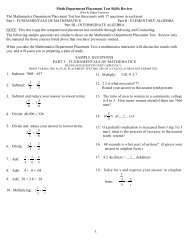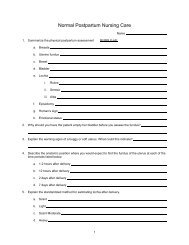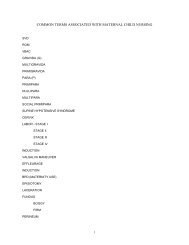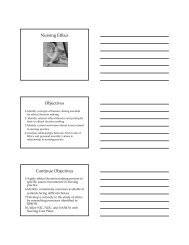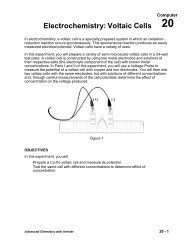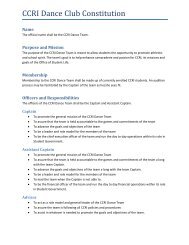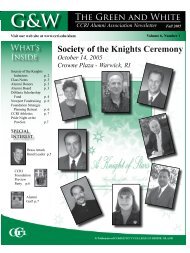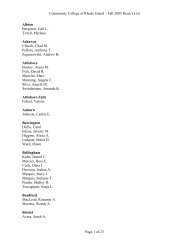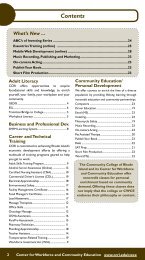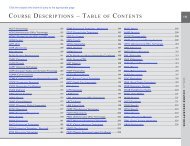Course Descriptions - Community College of Rhode Island
Course Descriptions - Community College of Rhode Island
Course Descriptions - Community College of Rhode Island
You also want an ePaper? Increase the reach of your titles
YUMPU automatically turns print PDFs into web optimized ePapers that Google loves.
quality surveyor’s drawings. Topics include<br />
topographical plans, property, surveys,<br />
subdivision plans, planametric drawings and<br />
site plans. (Prerequisite: MATH 1700) Lecture:<br />
2 hours, Lab: 4 hours<br />
ENGT 1420 - Land Surveying II -<br />
3 Credits<br />
This course is designed to prepare students<br />
with in-depth knowledge <strong>of</strong> federal,<br />
state and local land use regulations. Competencies<br />
covered are field measurements,<br />
survey calculations, evidence gathering and<br />
assessment, boundary determination and<br />
applicability <strong>of</strong> emerging technologies. In<br />
addition, all state and federal regulations<br />
regarding land surveying are reviewed.<br />
(Prerequisites: ENGT 1060 or CVE-240 and<br />
CVE-241, CAD/Drafting experience) Lecture:<br />
3 hours, Lab: 1 hour<br />
ENGT 2090 - Advanced Solid Modeling -<br />
3 Credits<br />
Advanced Solid Modeling enables students<br />
to work with advanced designs and assemblies.<br />
This includes mold design, sheet<br />
metal design, weldments and industry specific<br />
design tools. Students learn to use<br />
COSMOSWorks to study deflections and<br />
load stress on their designs. Other applications<br />
would include rendering in Photo-<br />
Works and animation techniques.<br />
(Prerequisite: ENGT- 1090 or instructor’s<br />
approval) Lecture: 2 hours Lab: 2 hours<br />
ENGT 2410 - Methods and Operations<br />
Analysis - 4 Credits<br />
This course studies the techniques used in<br />
determining methods <strong>of</strong> production from<br />
elementary to advanced stages. Emphasis<br />
is on methods engineering, operations<br />
analysis, production scheduling and process<br />
flowchart preparation. (Prerequisites: MATH<br />
1700 and 1710) Lecture: 3 hours, Lab: 3 hours<br />
ENGT 2430 - Process Planning -<br />
4 Credits<br />
This course covers the fundamental principles,<br />
practices and methods <strong>of</strong> process<br />
planning. (Prerequisite: ENGT 1020) Lecture:<br />
3 hours, Lab: 3 hours<br />
ENGT 2500 - Heating Ventilation and<br />
Air Conditioning (HVAC) - 3 Credits<br />
This course is for people who want to<br />
learn to design heating, ventilation and air<br />
conditioning systems for large commercial<br />
and institutional buildings. Topics covered<br />
include heat transmission <strong>of</strong> buildings, hot<br />
water and steam boilers, chimney design,<br />
ventilation air analysis, duct design, automatic<br />
controls and cost estimating.<br />
ENGT 2850 - Plant Layout and<br />
Materials Handling - 3 Credits<br />
This course studies the relationship<br />
between good plant layout and efficient<br />
materials handling, including basic packaging<br />
and materials protection methods. Lecture:<br />
2 hours, Lab: 2 hours<br />
eTee (engineering<br />
TeChnology - eleCTriCAl)<br />
ETEE 1050 - Introduction to<br />
Electromechanical Systems - 3 Credits<br />
The course introduces students to the<br />
nature <strong>of</strong> electricity and magnetism, and<br />
applications <strong>of</strong> practical electrical and<br />
electromechanical devices and systems.<br />
Students study electrical laws in basic DC<br />
and AC circuits, and the behavior <strong>of</strong> passive<br />
and active circuits and components.<br />
Students also are be introduced to basic<br />
electromechanical components such as<br />
relays, switches, motors and generators.<br />
The course emphasizes a systems approach<br />
to utilizing and testing electromagnetic<br />
technology. Both hands-on labs and s<strong>of</strong>tware<br />
simulation are used to develop an<br />
understanding <strong>of</strong> combining components<br />
to form complex systems and the tech-<br />
niques to evaluate the performance <strong>of</strong><br />
electromechanical systems. (Corequisite:<br />
MATH 1200 or permission <strong>of</strong> the instructor)<br />
Lecture: 2 hours, Lab: 2 hours<br />
ETEE 1100 - Engineering Applications<br />
<strong>of</strong> Computers - 3 Credits<br />
Students are introduced to microprocessor<br />
and microcontroller architectures. Machine,<br />
assembly and high-level languages will be<br />
examined. A combination <strong>of</strong> assembly and<br />
a high-level language are applied to solving<br />
problems using a popular microcontroller<br />
development environment and target<br />
hardware system. Data and graphic information<br />
types and formats are described<br />
and used in programs. Acquiring data from<br />
internal and external sources, communicating<br />
across networks, and directing output<br />
to displays and other external interfaces<br />
are also be explored. Student lab activities<br />
include developing and debugging programs<br />
used to control electromechanical devices,<br />
measuring operating parameters, collecting<br />
data, and displaying information. (Prerequisites:<br />
MATH 1200, ETEE 1800, Lecture: 2<br />
hours, Lab: 2 hours<br />
ETEE 1120 - Electronic Devices and<br />
Circuits - 3 Credits<br />
This course is a study <strong>of</strong> the basic laws <strong>of</strong><br />
electronic circuit theory applied to electronic<br />
devices with emphasis on solid state<br />
devices, including the theory and operation<br />
<strong>of</strong> semi-conductor diodes and transistors.<br />
Operational amplifiers, oscillators, active<br />
filters and switching circuits are emphasized<br />
and analyzed in laboratory experiments.<br />
Analysis techniques include the use<br />
<strong>of</strong> Bode plots and computerized experiments<br />
using circuit simulation s<strong>of</strong>tware in<br />
addition to bench work wiring up circuits<br />
that are analyzed and then tested. (Prerequisite:<br />
ETEE 1500) Lecture: 2 hours, Lab: 2 hours<br />
Prerequisite: Successful completion <strong>of</strong> course required before registering. Corequisite: <strong>Course</strong> must be taken prior to or at the same time.<br />
engt-etee<br />
ETEE 1500 - Electrical Systems 1 -<br />
4 Credits<br />
This course covers AC and DC circuits.<br />
Analysis techniques are taught and implemented<br />
in laboratory experiments using<br />
both physical components and instruments,<br />
and computer analysis. Impedance and<br />
networks and passive filters are studied.<br />
Power transformers and single phase/<br />
three phase power distribution are introduced.<br />
(Prerequisites: ETEE 1050, MATH<br />
1200, Corequisites: MATH 1210) Lecture: 2<br />
hours Lab: 2 hours<br />
ETEE 1800 - Digital Systems - 3 Credits<br />
Students learn about digital logic as implemented<br />
with hardware, ROM logic/look<br />
up tables, and programmable devices. The<br />
basic format and architecture is introduced<br />
with an analysis <strong>of</strong> several representative<br />
products including specifications. Basic<br />
programming techniques using Hardware<br />
Description Languages are introduced to<br />
allow a student to create simple circuits<br />
for evaluation. Instruction sets, programming<br />
languages and basic programming<br />
techniques will be reviewed. Parallel buses,<br />
common parallel buses, serial interfaces<br />
and Ethernet interfaces are covered. The<br />
data conversion process covering sampling<br />
theory, and analog-to-digital methods are<br />
examined. Instrumentation will include use<br />
<strong>of</strong> oscilloscopes, logic analyzers, word and<br />
pulse generators. The course also includes<br />
a brief introduction to programming languages<br />
such as assembly, Visual BASIC and<br />
C. (Corequisite: ETEE 1050) Lecture: 2 hours,<br />
Lab: 2 hours<br />
ETEE 2360 - Networking Systems<br />
Technology - 3 Credits<br />
In this course, students study networks<br />
from the ground up. Networking concepts<br />
and theory are presented in the classroom.<br />
Voice, video and data communications<br />
over local (LAN) and wide area (WAN)<br />
networks will be examined. The planning,<br />
169



